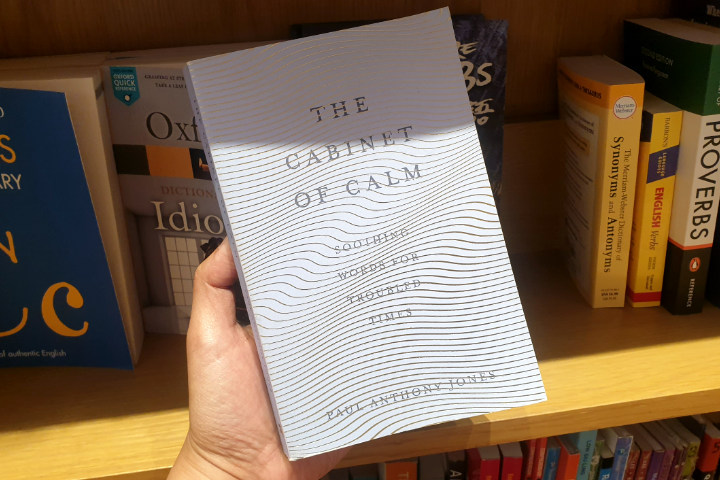A unique book that explores unusual, comforting words from history, offering solace and understanding. Each word has a story, helping readers find peace and perspective in challenging times.
In “The Cabinet of Calm,” Paul Anthony Jones offers a refreshing meditation on the wonders of language and the strange serenity that can be found in the forgotten and peculiar corners of our lexicon.
This opening statement itself arouses curiosity out of any wordsmith.
In a world that often feels tumultuous, this book stands as an oasis of quiet reflection, where words—those often-overlooked building blocks of human interaction—become both the subject of fascination and a source of solace.
It invites us into this treasure chest of forgotten language, where we find ourselves marveling at the subtle beauty of terms that time has cast aside.
The narration is a playful exploration of words, and a reminder that language is more than just a utilitarian tool. It’s a living, breathing entity, capable of evoking emotions and memories long buried.
It takes readers on an enchanting journey through language where words become more than mere symbols on a page. They transform into vessels of comfort and understanding. Like wrapping oneself in a cozy literary blanket on a stormy day.
At its core, the book is a collection of quirky, obsolete words and expressions, each accompanied by rich historical context and contemporary relevance.
These terms are presented with the care of an archivist, one with a sense of humor, and weaves them into a narrative that both educates and entertains.
It’s no overstatement to say that it’s a work that delights in the oddities of language, where seemingly nonsensical words take on new life and meaning.
A balm for the weary soul, offering solace through language.
One of the book’s great pleasures is the way it makes the reader pause and consider the seemingly trivial, yet immensely powerful nature of words.
A word like “hiraeth,” for example, which denotes a deep, homesick yearning for a place that may never have existed, becomes not just a quaint relic of Welsh culture but a window into the universal human experience of longing.
The author’s ability to take these obscure terms and place them within the context of our present lives is what makes the book so enjoyable.
He doesn’t just look at words as artifacts of the past. He demonstrates their ongoing relevance in today’s world.
For instance, a term like “catacosmesis,” which refers to rhetoric, might seem like something best left in the dusty corners of an old dictionary.
However, Jones playfully reminds us that there’s something oddly soothing about the thought of this word, evoking imagery of warmth and comfort.
It’s not just the word’s meaning that matters.
It’s how it fits into the fabric of human existence, how it taps into our experiences, no matter how seemingly unrelated they might be.
This book is a testament to the idea that words hold power. Not just to communicate but to heal.
It’s inspiring that the beauty of how language can bridge gaps between past and present, provide us with tools to articulate emotions we might otherwise struggle to express.
The humor carefully placed within the text makes it clear from the outset that this isn’t a dry lexicographic exercise.
If you can imagine the author narrating the content, you’ll find that the voice is warm, witty, and laden with puns, much like the words he so lovingly revives.
When explaining “redamancy” (the state of love and being loved), Jones also cheekily remarks that it’s an unlikely prospect when one is pulling through a failed relationship. A quick turn of phrase, but it hits the mark with the same precision as one of the words he describes.
This sense of play is one of the book’s most endearing qualities. Making it feel less like a textbook and more like a lively conversation with an old friend, the kind who constantly has a new tidbit to share that makes you see the world in a slightly different way.
And it’s not all fun and games.
The book also subtly addresses the melancholy that lingers in many of these forgotten words.
Take “wakerife,” for example, which is the unwillingness to go to sleep. It’s a humbling, and at times sobering, thought, and the word captures it with a beauty that feels almost too perplexing to be real.
There’s something undeniably poignant about these words, which is why Jones’ work doesn’t simply linger in the realm of language games.
It taps into something deeper.

As you flip through the pages, the words begin to take on a life of their own, revealing facets of the human experience that we may have overlooked in our rush to embrace the modern world.
Each word becomes an invitation to explore its nuances and implications.
The book also beautifully illustrates that these words are not just quaint relics of a bygone era but reflections of the world we live in.
While The Cabinet of Calm may introduce us to the obscure and the forgotten, it also offers a window into how language shapes our perception of the world.
There’s something remarkable in the way language evolves. Some words fade away, while others emerge to take their place.
The fact that certain words have been lost to time only enhances their beauty and mystique.
In that sense, the book is an elegy to the impermanence of language, a testament to the ebb and flow of human expression.
One of the most striking aspects of this title is its message about the quiet power of language to bring about calmness, if not clarity.
As if the sheer event of encountering an unfamiliar word, one that evokes a feeling or concept you’ve never quite put into words, can be an instant source of tranquility.
Whether it’s the serenity of the word “nemorivagant,” meaning someone who like to wander into the woods, or the soothing connotation of “villeggiatura,” which refers to a grand residence in the countryside, or words like “kakorrhaphiophobia,” which describes the the fear of failure, the collection has the uncanny ability to evoke a sense of peace that comes from the contemplation of something simple yet profound.
Biggest Takeaway
Perhaps the biggest idea that lodged in my mind is that we often fail to appreciate the quiet, simple pleasures that words bring to our lives.
Language has the power to ground us in moments of uncertainty.
The act of discovering an unfamiliar word, particularly one that fits perfectly into a gap in our emotional or intellectual landscape, is akin to uncovering a hidden treasure.
A word a day keeps the chaos at bay.
It’s not just a moment of linguistic fascination. It’s a reminder that the world, despite its chaos, is full of small, delightful moments that can provide us with comfort and perspective.
When moments in life feels overwhelming, finding the right word can provide clarity and reassurance.
Like finding the perfect puzzle piece that completes the picture, offering perspective where there was once confusion.
The world of language is far from static.
It’s a playground for the curious, a place where every word, no matter how obscure, carries with it a piece of history, culture, and human emotion.
And this book is more than a simple catalog words.
It offers a meditation on the nature of language itself. One that comes subtly in its fluidity, its malleability, and its boundless capacity to capture the vastness of human experience.
And, in that sense, this is not only a book about words in the literal sense. It’s a celebration of life’s quieter moments, the kind that often go unnoticed in our bustling world but have the power to bring us back to a place of stillness and reflection.
After all, it would be superficial to see this book as just a collection of antique words. It’s more of an exploration into the heart of what makes us human.
It invites us to reconnect with language in all it’s depth, beauty, and glory.
Whether you’re a lover of language or simply someone searching for a little peace, this book will remind you of the small joys that await in the most unexpected of places.




